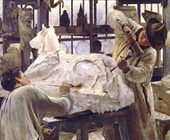 I received a very kind letter from a gentleman who read and appreciated many of the concepts found in Return to Order. However, after some generous compliments about the work, he concluded that the application of the book’s principles is highly unlikely.
I received a very kind letter from a gentleman who read and appreciated many of the concepts found in Return to Order. However, after some generous compliments about the work, he concluded that the application of the book’s principles is highly unlikely.
“Human nature being what it is,” he noted, “the prospect of people’s acting on such principles when to do so would conflict with apparent profit potential appears remote.”
Such a position reflects a classical liberal stance that profit or self-interest is seen as the sole motivation for man’s acts. Human actions are caused by either the pursuit of pleasure or the avoidance of pain. According to this modern school of thought, to expect people to act selflessly runs contrary to reality and reason.
Thus, to those who might think the book is somewhat naïve by assuming that men can act beyond what appears to be their own self-interest, I thought it might be interesting to list those areas in our present day society where men put principles above profit and value character more than capital. In this way, we can show that acting upon the principles mentioned in Return to Order is not only possible, but plausible. In other words, acting in “conflict with apparent profit potential” is not a pipe dream, but actually quite common in our postmodern society. As Return to Order affirms, selfless action occurs especially in a society where honor rules. The fact that we can still find many remnants of this action in today’s hostile culture is proof that our thesis is not unrealistic. Moreover, these same actions attract youth which ensures they have a future.

The first area of selfless action I would list is that of the Church. Aided by grace, countless men and women live abnegated lives, to worship and give glory to God. They often give up promising careers and fulfilling lives to help their fellow men out of love of God. The priest adopts the celibate life to more freely serve the Church; likewise, the young nun offers up her virginity; the faithful are encouraged to embrace both the joys and sufferings that life affords. In so doing, the Church encourages a broad and realistic vision of life that extends beyond self-interest alone that so constricts and saddens the lives of men.
A second field of action where self-interest does not rule would be that of the military. The military profession is sustained much more by a sense of honor than a desire for money. The underpaid soldier puts the welfare of the nation above his own. In the blossoming years of youth, he volunteers to endure heat, cold, hunger, wounds and enemy fire. He is disposed at every moment to forfeit all, rendering the ultimate sacrifice – his very life.
A third field of action is that of the traditional family. In this case, the spouses put their union and their children’s welfare above their own self-interest.  Contrary to the hedonistic same-sex unions of our days where self-gratification is the supreme goal, spouses in a traditional marriage vow to remain united until death parts them, for better or worse, in sickness and health, in poverty and riches, in a selfless act of mutual giving to one another. They welcome into their lives the blessings of children who they must support and love at great sacrifice…and with great joys. The mother selflessly gives birth to new life often at the expense of her career and both parents expose themselves to endure possible tragedy, disappointment and ingratitude.
Contrary to the hedonistic same-sex unions of our days where self-gratification is the supreme goal, spouses in a traditional marriage vow to remain united until death parts them, for better or worse, in sickness and health, in poverty and riches, in a selfless act of mutual giving to one another. They welcome into their lives the blessings of children who they must support and love at great sacrifice…and with great joys. The mother selflessly gives birth to new life often at the expense of her career and both parents expose themselves to endure possible tragedy, disappointment and ingratitude.
 We find selfless action among true artists, craftsmen and artisans. This is a class of people who take upon themselves the task of doing things well and experience a disinterested joy in seeing anything perfect, beautiful, or well made—even when not their own. We might single out an artist who is willing to forego monetary gain in order to paint a masterpiece, solely for beauty’s sake.
We find selfless action among true artists, craftsmen and artisans. This is a class of people who take upon themselves the task of doing things well and experience a disinterested joy in seeing anything perfect, beautiful, or well made—even when not their own. We might single out an artist who is willing to forego monetary gain in order to paint a masterpiece, solely for beauty’s sake.
Finally, we might mention the role of true and natural leaders at all levels of society who take upon themselves the burden of leadership to serve the common good. We think of that teacher who gives all to inspire and help students; that businessman who takes the interests of his workers to heart by helping them in matters beyond the cold and rigid terms of a labor contract; that doctor who gives freely of his time in providing medical care to patients who are unable to pay him for his services. In short, those who hold positions of true leadership usually excel by going beyond self-interest, thereby earning the admiration and respect of those who follow.
These are but some examples of fields where self-interest and profit are not the sole motivation for action. Someone might object that since these actions can eventually bring about joy and even profit, they ultimately favor self-interest. To this, I would respond that they do not always bring about joy. The person engaged in these actions must take a risk that may result in misunderstanding, failure, suffering or disappointment. The person must usually forego an immediate pleasure and embrace a situation of suffering and sacrifice. This is especially true in a Christian society where men are motivated to do things by a pure love of God. Such a society is contrary to the culture of instant gratification that accompanies the actions of those who follow only what I call the rule of money.
Moreover, I would respond that this tendency to go beyond self-interest is not something exceptional. Rather, we naturally tend toward the spiritual values of the good, true and beautiful while our materialistic culture (under the rule of money) tries to suppress them. Human nature, being what it is, is also drawn to metaphysical and spiritual values. We are drawn to the rule of honor that highlights these values.
In fact, this rule is so powerful that when honor is spread throughout all levels of society, the rule of money loses its attraction. When honor reigns, money’s influence wanes, institutions are zealous of their reputation, families uphold their good name, and culture flourishes.
And so, I can agree with my reader that there are indeed many in our present culture who only pursue their self-interest, to the point of selfishness. I would even admit this self-interest could benefit economy. However, I would disagree that this is the only motivation of human action. There are still many today who forego pleasure and embrace suffering for a noble cause and this serves a very important function in society.  This self-sacrifice provides the cement that bonds people together. It forges ties of confidence and trust which many sociologists call the “social capital” that makes for good economy. In times of crisis, those accustomed to looking beyond self-interest provide leadership and direction.
This self-sacrifice provides the cement that bonds people together. It forges ties of confidence and trust which many sociologists call the “social capital” that makes for good economy. In times of crisis, those accustomed to looking beyond self-interest provide leadership and direction.
Return to Order was written for that sector of public opinion that values honor over money. I believe the rule of honor is still a fitting response to the rule of money. And I believe that, with the help of God, a return to such a rule is not only necessary, but possible.



